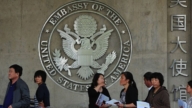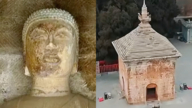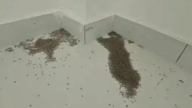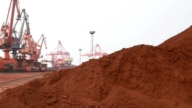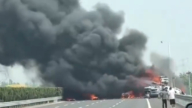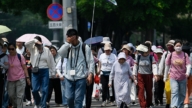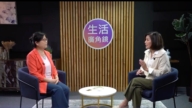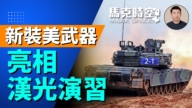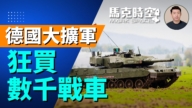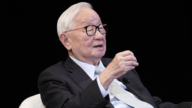【新唐人2013年11月26日讯】青岛“11.22爆炸事件”发生后,当地媒体对于这起惨案的迟报、瞒报、谎报、冷处理等做法,遭到了全民谴责。但青岛媒体人微博控诉,他们并非冷血,只是“手脚暂时被捆住”。同时,网路传出青岛当局限制记者进入医院调查,青岛媒体收到上级简讯等消息。网民愤怒质问:背后下令的手,你对得起青岛吗?
据大陆媒体报导,从“中石化”青岛输油管线爆炸事故现场指挥部传来消息说,截至24号13点,爆炸导致的死亡人数达到52人,失踪11人。但显然,大陆官媒公布的这一数字无法令百姓信服,人们仍然在私下里打听和猜测着死亡的真实人数。
有民众披露,青岛四大医院的伤员爆满。伤者家属高小姐对外透露,和她亲人同车拉到医院的有5人,“目前仅生存一个,内部说死亡100多个了”。高小姐认为,死亡肯定不止几十人,她见到和直接知道的就已经超过了官方报导的数字。
据香港《苹果日报》24号报导,爆炸现场救援人员说:“后果已经远远超过我当初的想像”。各家医院死亡人数不断攀升,但当局已开始限制记者入内采访。此外,网传有青岛媒体记者披露他们接到上级简讯,并表示﹕内容不说大家都猜得出来。
究竟是什么力量在背后左右着青岛当局和媒体? 愤怒的民众质问:“背后下令的手,你对得起青岛吗?”
原《河北广播电台》编辑 朱欣欣:“它怕媒体亲自到当地采访的时候,爆料出更多的内幕或者是事件的真相,另外还有怕媒体把民众真实的一些看法和想法与官方相矛盾的、相对立的一些观点传播出去。”
在此之前,青岛媒体在爆炸事件中所表现的冷漠和麻木,早已激起了全民的愤慨,网路上骂声一片。而最令青岛人民无法接受的是,同样的爆炸案,大陆各地媒体都给予了极大关注,不少地方都是头版大篇幅报导,但青岛当地的数家媒体的头版却只字未提。
美国《大纪元》新闻网报导,一位摄影师表示,他特意去青岛本地报社门口看报纸,只看到头版几行小字是有关爆炸案的,讽刺的是,底板报导国外一家超市坍塌的新闻更加醒目,还配有照片。他围着报栏转了一圈,各版没有一张黄岛爆炸照片。
青岛当地官报《半岛都市报》甚至出现号召民众抢购海参的广告。网友为此创作了一首名为《抢海参》的歌曲讽刺媒体。
“爆炸事故导致原油流入大海,海参就要受到污染现在快去买,今冬最低价2980块,吃着海参祈福心情没有那么坏,忘掉痛苦、忘掉悲伤,快去抢海参。”
在沸腾的民怨下,《半岛都市报》直到24号才对爆炸案进行大篇幅报导,但整整九大版面却布满了《官兵做饭 百姓喊香》《最佳医护 最好救治》《水电气已通,生活步入正轨》《住安置点 如家温暖》之类粉饰太平、歌功颂德式的报导。于是,民众再次愤怒了。
《新周刊》讽刺:“你眼睁睁的看着,一件丧事最后给办成了一件喜事。”网民干脆提议:换个标题吧,人民群众“喜迎”管道爆炸!
朱欣欣:“它们就是想尽量把事情控制在它自己允许的范围内,或者是它自己所定的这个报导的调子,它想怎么样,从哪个角度来报导这个事情,它要加以控制,往往是它根据它的需要搞了一个‘标准’的文本,来对外公布。这里面其实有很多很多的隐瞒,或者是扭曲。”
但是,面对着铺天盖地的骂声,有青岛媒体人在网上诉苦自辩,惨剧发生,当地媒体人也痛苦、无奈、委屈,但他们的“手脚暂时被捆住”了。对此,微博名为“郭敬明有话说”的网友反驳:专治下的体制,不是暂时的捆绑,是永久的奴役。
采访/常春 编辑/张天宇 后制/陈建铭
Reporters Stopped From Investigating Qingdao Explosion
Local media in Qingdao have received condemnation
for late, false and cold reporting of the “11.22 explosion".
Qingdao media staff microblogged
that they are not cold-blooded.
Rather, their hands and feet were temporarily bound.
Internet reports suggest the Qingdao authorities
restricted reporters’ investigations in the hospitals.
Qingdao media also reportedly received a brief
from higher level authorities, on what to report.
Netizens asked in anger whether the people
behind the order have a conscience for Qingdao?
Chinese state media reports state that up until
1pm on November 24, there were 52 people
confirmed dead, with a further 11 missing,
from the Qingdao Sinopec pipeline explosion.
Chinese people remain unconvinced about the official
figures, as they continue to investigate the real numbers.
Members of the public disclosed that the four big
hospitals in Qingdao were full of wounded people.
Miss Gao, a family member of an injured victim,
said there were 5 people hospitalized from her family.
Only one survived. Internally, it has been
reported that more than 100 people have died.
Miss Gao thinks there may be dozens of people
dead, and that the numbers exceed official reports,
based on what she has seen and learned directly.
A report in Hong Kong’s Apple Daily newspaper on
November 24 contained interviews with rescue workers.
“It is far worse than I first imagined".
With rising death tolls in each hospital, the authorities
have started limiting reporter interviews in the hospitals.
Internet reports suggest that Qingdao journalists
received directives from higher level authorities.
It was said that everyone can
guess the content of the message.
Who is the force behind the control of
the Qingdao authorities and the media?
Netizens asked in anger whether the people
behind the order have a conscience for Qingdao?
Zhu Xinxin, former Hebei Radio editor: “They fear that onsite
media interviews may reveal more truths about the incident.
They also fear that the media will spread some real
public views, and opinions that oppose the official’s."
Prior to this, Qingdao media’s apparent apathy
towards the explosion sparked a national outrage,
with widespread condemnation over the internet.
Qingdao people found it unacceptable that the explosion
did not make local headline news, in comparison with other
Chinese media, in which the reports were headline news.
The Epoch Times reported a story from a photographer,
who went to read Qingdao local newspapers, and
only found a few lines of news about the explosion.
The report was in small print, on
the front page of a local newspaper.
News of the supermarket collapse in Latvia had made
headline news, with dominant photographs on the page.
He looked through the newspaper, and could
not find any photographs of the explosion.
Bandao Metropolis Daily, an official Qingdao
local newspaper, advertised cucumbers for sale.
Netizens created a song called “grab the cucumber"
to satirize the media reporting on the explosion.
“After the explosion, the crude oil leaks could
enter the sea, and contaminate the cucumbers.
Let’s go to buy cucumbers now; the
lowest price for this winter is 2980 RMB.
We pray that eating cucumbers will make you forget the
pain, forget the sadness. Let’s go buy cucumbers quickly."
Under pressure from public grievances, Bandao
Metropolis Daily reported on the explosion
with extensive coverage on November 24.
It covered nine pages of news, but readers
felt that some reports falsified the situation.
Reports included subjects such as; “soldiers cooking food,
civilians praise as tasty"; “the best nurses, the best rescuers";
“life goes back to normal, electricity and gas supply restored";
and “living in the rescue center is cozy, and just like home".
New Weekly satirized the reports, saying that “you can
tell that they finally made a funeral seem like a good thing."
Netizens suggested changing the title to;
“people celebrate pipeline explosion".
Zhu Xinxin: “They just try to force things
under their own control, or follow their voice.
They think it should be controlled on how to report
on the incident, and from which point of view to report.
They often engage in a standardized format
based on their needs on what to announce.
There is actually a lot of concealment or distortion."
Facing overwhelming condemnation, some people
from te Qingdao media defended their actions online.
They are suffering grievances and frustration,
because their hands are bound temporarily.
A micro-blog named “Guo Jingming has
retorted that it’s not temporary binding, but
permanent slavery under a tyrannical system.
Interview/ChangChun Edit/ZhangTianyu Post-Production/ChenJianmin


